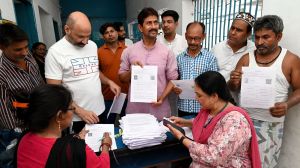Stay updated with the latest - Click here to follow us on Instagram
Akshardham attack: SC declines to grant compensation to 6 acquitted in case
Underlining the peril of creating such precedents, the Supreme Court Tuesday declined to grant compensation to six men, convicted by a trial court but acquitted by the top court in the 2002 Akshardham temple terror attack case. Following their acquittal by the Supreme Court in May 2014, the accused had filed fresh petitions, demanding compensation […]
 The men were convicted of conspiring to retaliate against post-Godhra riots
The men were convicted of conspiring to retaliate against post-Godhra riots
Underlining the peril of creating such precedents, the Supreme Court Tuesday declined to grant compensation to six men, convicted by a trial court but acquitted by the top court in the 2002 Akshardham temple terror attack case.
Following their acquittal by the Supreme Court in May 2014, the accused had filed fresh petitions, demanding compensation for their wrongful prosecution and protracted trial during which they remained incarcerated.
[related-post]
Watch Video: What’s making news
But a bench led by Justice Dipak Misra pointed out the dangers of allowing their plea and devising a principle to award compensation to those acquitted finally by the top court. “Most of the appeals travel to this court because it is the final appellate court. An appellate court can either uphold conviction or set it aside. An acquittal can be ordered on several grounds in a case since the guilt has to be proved beyond reasonable doubt by the prosecution. Can we lay down a principle to compensate everybody who gets acquitted by this court?” the bench asked senior counsel K T S Tulsi, who appeared for the petitioners.
Tulsi sought to make a distinction between his case and any other criminal case by referring to the judgment of the acquittal, in which the apex court had censured Gujarat Police for framing “innocent” persons. The court had indicted the then home minister (portfolio held by then CM Narendra Modi) for “non-application of mind” in granting approval for their trial under the Prevention of Terrorism Act.
The six convicts, three of whom were on death row, had been convicted of participating in the criminal conspiracy to retaliate against the post-Godhra riots by a terror strike at Akshardham temple in Gandhinagar.
Tulsi said that in view of indictment of the state government by the apex court for framing these men, the bench should grant exemplary compensation to accord some relief. However, the bench observed that the Supreme Court could not give compensation in all cases of acquittals, because the reasons for acquittals may vary.







